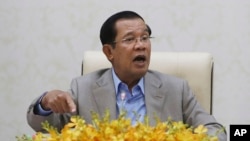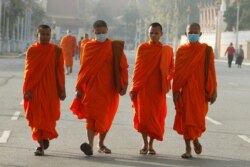Cambodian diplomats, consular officers and students stranded in China by the coronavirus outbreak may be scared. They may be bored. They may want to go home. Hun Sen, who has been prime minister of Cambodia since 1985, will have none of it.
Cambodians "who are currently working or studying in China, including those in Wuhan, have to remain there and join the Chinese people to fight this disease. Don't run away from the Chinese people during this difficult time," he said. "A friend in need is a friend in deed, as the old Cambodian saying goes." The Roman poet, Quintus Ennius (239-169 B.C.), is also creditedwith the phrase.
During a press conference Thursday, Hun Sen said, "I think China doesn't need our money to help them in China. We only have to cooperate with the Chinese embassy in Cambodia and treat Chinese investors, Chinese special economic zones, Chinese citizens, Chinese tourists who are working in or visiting Cambodia well. I think this is already our contribution: Don't discriminate against Chinese people."
The Cambodian Ministry of Health confirmed Monday that a Chinese man was the first case of the coronavirus in Cambodia. The patient had flown from Wuhan, the center of the outbreak, to Sihanoukville, a destination for Chinese real estate and casino investment.
And while there was anti-Chinese sentiment among some Cambodians before the virus emerged due to the investments, it is spreading elsewhere in Asia, and the rest of the world. In Hong Kong, South Korea and Vietnam, businesses have posted signs telling Chinese customers they're unwanted. Residents of Singapore are petitioning the government to ban Chinese nationals from entering the country.
For the 23 Cambodian students languishing in locked-down Wuhan, Hun Sen's words of friendship for China don't alleviate their fear or boredom. So far, all have avoided infection by the coronavirus, according to Nop Veasna, president of the Association of Cambodian Students in China.
Keat Pocheang is working on his master's degree in information technology at Wuhan University and has been keeping busy while isolated in his room. The 24-year-old says he keeps it clean, and has thought through his response to the coronavirus.
"I was initially very scared but over time I realized that being worried was not helpful, so I eventually got used to the new normal," he said.
He, like the other students, communicates with friends and family to feel less isolated.
Pen Barang said his mother, an elementary school teacher in his hometown of Svay Rieng, gives him a daily dose of encouragement.
"She is understandably very worried about me being in an outbreak zone. Still she encourages me by saying that everything will be fine because I am isolated in-room and won't be infected," he said. "She motivates me like this every time she calls."
Although the students told VOA they want to return home, that appears unlikely.
The Cambodian government said it has no plans to evacuate its stranded diplomats and students in Wuhan, in part because of their confidence in Chinese authorities handling the outbreak.
However, countries like Malaysia are reported to be waiting for China on its evacuation request, while Indonesia on Thursday announced it would evacuate its 243 stranded nationals in Wuhan, according to the Reuters news agency.
Sophat Soeung reported and wrote in Washington. Hul Reaksmey contributed to this story from Phnom Penh. Both are with VOA's Khmer service.









